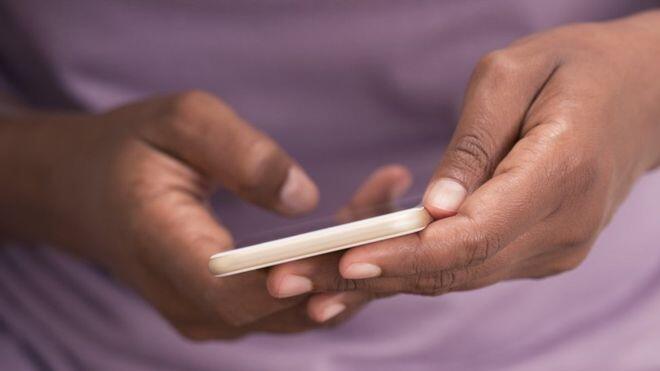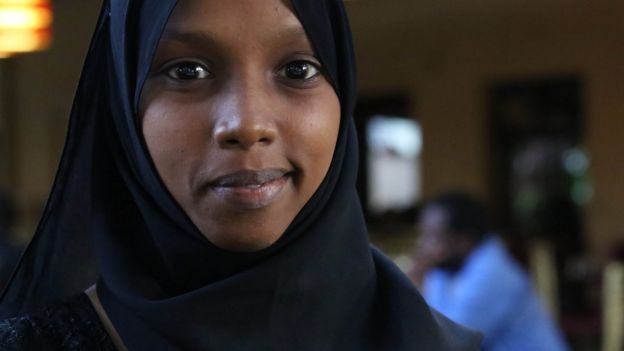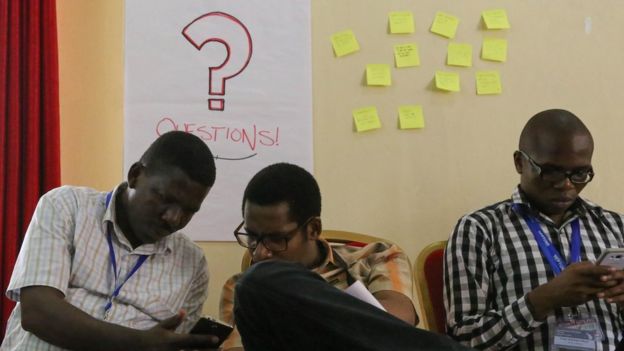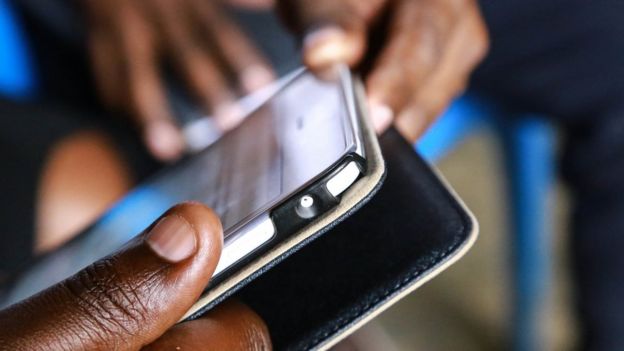Esther sells water on the side of the road in Kenya for a few dollars a day.
She also owns a smartphone and ownership of such a device should, according to most of the received wisdom, empower its owner.
But in fact it did quite the opposite for her when she acquired an app.
It claimed to diagnose HIV simply by analysing her fingerprint on the touch screen.
When researchers met her at her roadside workplace, she was worried.
“She did not know if it was true and she was panicking,” said researcher Laura de Reynal, who worked on a year-long study into the experiences of first-time smartphone users in Kenya.
“And she wasn’t the only one, there were others that came to us worried about this app and those were just the ones that were willing to speak out.”
The app was in fact a prank and anyone reading the comments on Google’s Play Store would have seen that.
However, many first-time smartphone users in Kenya get hold of apps via a friend’s Bluetooth connection, rather than downloading them via the net, in order to save data.
But the prank would not have been apparent via a Bluetooth share.
“People are not able to understand the limits of the technology,” said Ms de Reynal.
“They think, because it was on a smartphone, it seems real and credible.”
Commissioned by Mozilla – the organisation behind the Firefox operating system – the study was designed to find out what it is that limits people in the developing world from grabbing the opportunities offered by the web.
The study suggested that men often control and, in some cases, limit the internet usage of women.
It also claimed that providing access without proper training can actually worsen existing social problems such as gambling.
Esther’s issue has led the researchers to call on Google to embed warnings on such apps and to think harder about overcoming things such as language barriers.
People-powered chat
The web is largely in English while many of the new users in Kenya primarily speak Swahili or Sheng (a Swahili-English hybrid).
“These devices are designed in Silicon Valley where usage is taken for granted,” said Ms de Reynal.
“They could have features that change content into a local language, for instance,” said added.
Samantha Burton, who oversaw the project, agreed.
“Putting a smartphone into someone’s hands doesn’t necessary equal empowerment, new users need to learn how to use the tools,” she said.
The obvious answer is to provide digital literacy training, to answer questions such as how to manage data usage, how to reset passwords and how to spot fake news and other net-based scams.
But people desperate to earn a dollar are unlikely to have time for such workshops.
The Mozilla research team had to become creative and turned to the popular messaging app WhatsApp to create a chat tool with real people behind it to answer questions.
“Often the reason people get a smartphone is for communication – to use Facebook or WhatsApp – so having real people answering questions was incredibly popular,” said Ms Burton.
Faith, a small business owner in Nairobi, used her mobile to buy and sell goods online and to search for apps to entertain children at Sunday school.
She was also pretty savvy about usage; limiting hers to 35 megabytes per day, after which she cuts off access.
But, like other women in her circumstances, her smartphone use was not entirely governed by her.
Following an argument with her boyfriend, her phone was taken away, forcing her to purchase her own.
That mobile device, bought from a cousin in Rwanda, did not work and Faith did not know how to fix it.
“One day she had control and the next day she didn’t,” said Ms de Reynal.
New expenses
Women in Kenya are three times more likely to be given a smartphone as a gift from the men in their lives, who may also monitor WhatsApp and other usage.
A mobile phone is a big purchase for poor Kenyans.
At an average cost of $40 (£32), it takes many months to save up to buy one.
“Many had lost or broken their phones so that money is compounded by the extra cost of replacing a phone,” explained Ms de Reynal.
The cost of connecting is also a problem, and in some cases people have to “make a choice about buying more food or buying more data”.
But people are getting very savvy about connectivity.
“Lots of people had several Sim cards to take advantage of specific price deals while others were limiting their data use by sharing apps via Bluetooth rather than downloading them,” said Ms Burton.
Nairobi resident Evans has no regular employment and the money he does earn is used for betting.
His smartphone became a tool to research and improve his betting techniques.
He bet on football matches and used the phone to research the teams and their statistics.
In Kenya, mobile phone Sims are often tied into mobile money providers, such as M-Shwari, and this offered Evans another way to borrow money other than from his friends and neighbours.
Unlike a personal loan, which he tends to repay to prevent fights, he is much more blasé about online loans.
“He was defiant of strict loan repayment rules, which may have landed him on a financial blacklist,” said Ms de Reynal.
“He felt that as long as he threw away the Sim, he could buy another with no consequences,” she added.
These case studies illustrate that mobile ownership is complex and nuanced.
For those firms desperate to break into new markets, there are plenty of lessons to be learned.
Source: http://bbc.in/2oQ2Com














